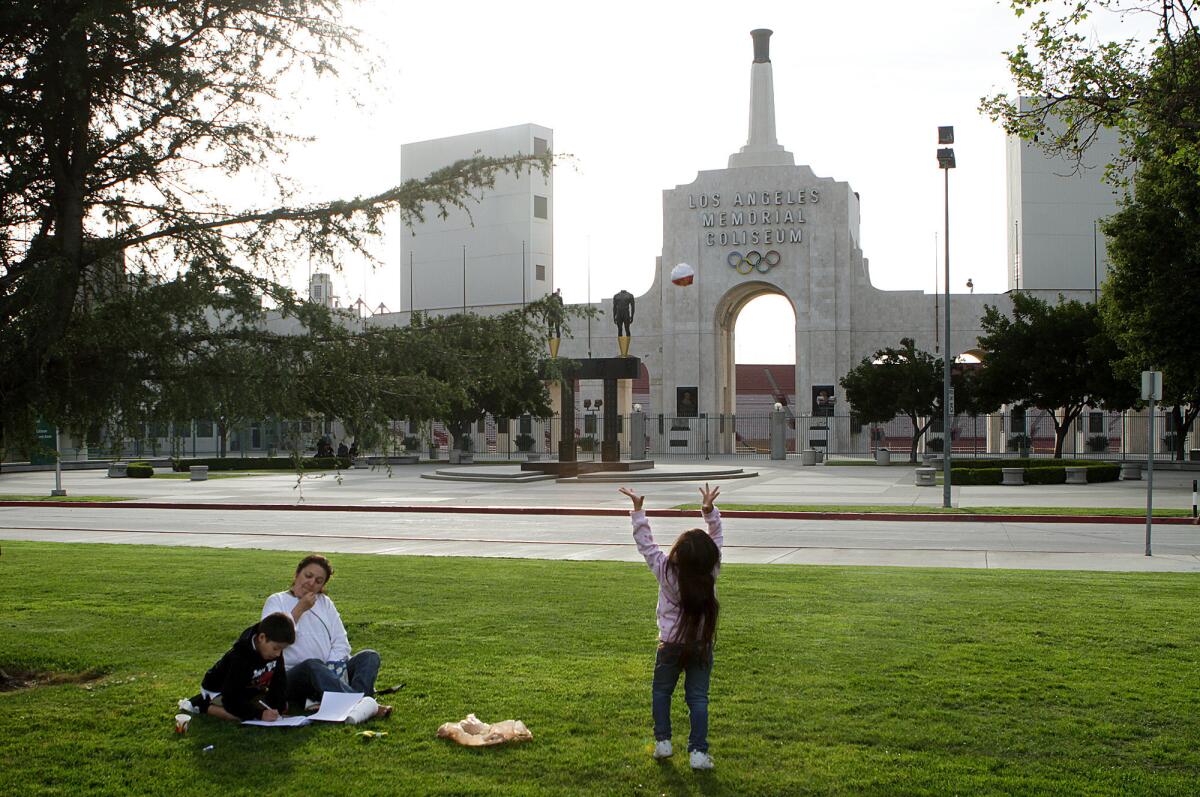Coliseum faces millions in losses

The governing body of the Los Angeles Memorial Coliseum learned Wednesday that it is expected to lose millions of dollars this fiscal year, driving the taxpayer-owned stadium into a much deeper financial ditch as it reels from a costly corruption scandal.
The dire forecast came on the same day that The Times and a 1st Amendment group sued the Coliseum Commission, accusing it of violating state laws by deliberating a lease in secret with USC and failing to release numerous public records.
The suit, filed in Los Angeles County Superior Court, seeks to nullify the Coliseum Commissionâs approval in May of the 42-year lease that gives USC near-total control of the historic stadium, where the university plays football.
The suit asks the court to order the commission to hold public deliberations on the lease and schedule a new vote on it. Joining The Times in the suit is the nonprofit Californians Aware.
A commission attorney said he could not comment on the suit because he had not seen it. In previous statements, however, the commission has said its actions on the USC agreement complied with the open-meeting law known as the Brown Act.
The commission also has denied running afoul of the California Public Records Act. The Times alleges that the commission has withheld or improperly delayed the release of documents that should be available to the public, including records of communications between USC and the Coliseumâs interim general manager.
The suit does not name USC, a private institution.
The commission sought the new lease after running out of money to pay for stadium upgrades it promised USC under the current agreement. That happened shortly after the scandal erupted in early 2011, following Times reports on alleged financial irregularities.
A resulting investigation by the Los Angeles County district attorneyâs office led to the indictment last March of three former Coliseum managers and three other people who did business with the commission.
According to prosecutors, a spree of alleged bribery, embezzlement, kickbacks and conflicts of interest involving the defendants cost the commission more than $2 million.
The commission is a joint authority of the city, county and state.
Its most prominent members are Los Angeles County Supervisors Zev Yaroslavsky, Don Knabe and Mark Ridley-Thomas.
At Wednesdayâs regular commission meeting, the panel learned that losses for the year ending next June 30 would probably total about $5 million -- roughly a third of the Coliseumâs total operating budget.
In May, the commissionâs losses jumped to $435,000 -- nearly seven times the projected amount, a budget report showed.
A month ago, commission documents indicated the Coliseum would have a negative bank balance before the end of 2012.
Among the propertyâs mounting expenses are legal fees and insurance premiums, which have increased largely because of the scandal, officials said.
Despite the red ink, commissioners defended the administration of interim General Manager John Sandbrook, who took the helm in March 2011, after the resignation of Patrick Lynch, one of the former officials charged in the indictment.
âI think that our management is doing a very good job trying to manage the budget,â said Commissioner Glenn Sonnenberg, a former USC trustee. âWeâre dealing with a public facility that is a money-losing operation for all sorts of reasons.â
Meanwhile, in the suit, The Times and Californians Aware allege that the commission violated the Brown Act by repeatedly going behind closed doors to deliberate the lease in monthly meetings, while engaging in virtually no public discussions of the deal.
A commission attorney, Assistant County Counsel Thomas Faughnan, said in a letter earlier this month that the panel followed the law.
The letter said the commission is entitled to meet in closed session with its property negotiators, and panel members publicly discussed the lease at its May 14 meeting before approving it on an 8-1 vote.
--
More to Read
Sign up for Essential California
The most important California stories and recommendations in your inbox every morning.
You may occasionally receive promotional content from the Los Angeles Times.












